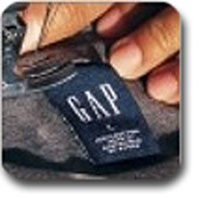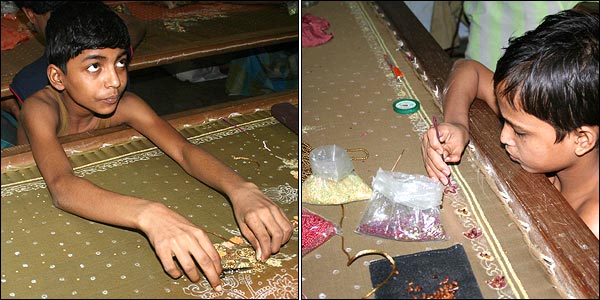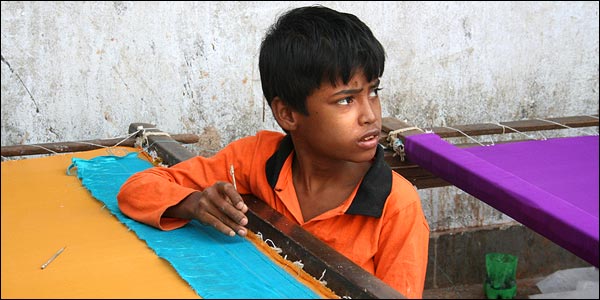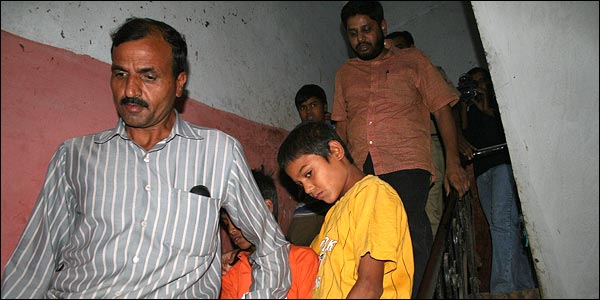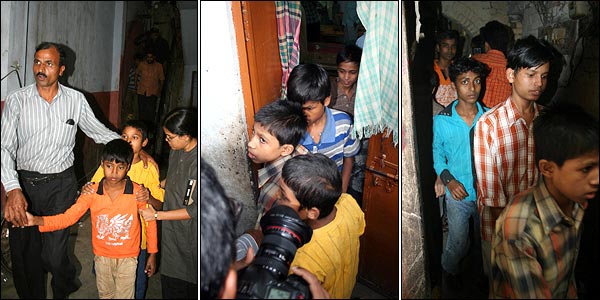| Gap's Child Slavery
The Fashion eZine - Sweatshops
Kids work in filth with no pay...NEW DELHI – With Gap Inc. under fire for selling clothes made by children in India, activists and police raided a sweatshop in New Delhi where 14 boys were embroidering women's garments yesterday, illustrating the widespread problem of child labour in the country. The children were as young as 10, came from a poor farming district on the other side of the country, and said they had never been given promised wages for working up to 15 hours a day embroidering sequins onto the flowing saris worn by Indian women. The working and living conditions in the sweatshop just houses from where the Gap clothes were being made were grim – the boys were packed into a filthy room, sleeping on the same floor where they sewed all day. "I don't want my money any more. Now I want to go home," said a thin 15-year-old boy who gave his name only as Hatiquallah. Speaking at a nearby police station after the raid, Hatiquallah said he had been brought to New Delhi three years ago by a man who promised him work – and money. He never told his parents he was leaving.
"I was waiting for my wages," he replied when asked why he stayed. "I don't want them now.'' India's transformation in the past decade into an emerging global economic power has done little to alleviate the country's widespread poverty – and the problems that go along with it, such as child labour. The government estimates 13 million children work here, many of them in hazardous industries, such as glass making, where such labour has long been banned. Rights activists place the number as high as 60 million – one estimate has 20 per cent of India's economy dependent on kids under the age of 14. The scope of the problem was clear yesterday in the warren of narrow and dark alleys in New Delhi's Shahpur Jat neighbourhood, where the sari sweatshop was found just a few houses down from the now-shuttered operation that made Gap clothes. "Every other house is like this – there are children working in small garment units," said a police officer involved in the raid, Birpal Singh.
Police said they believed the saris were for sale within India. But the widespread use of child labour in India and the discovery that kids were making clothes for the Gap, which has 90 full-time inspectors who travel around the world, raises questions for India's garment exporting industry, a $10 billion a year business that grew by more than 20 per cent last year. Some of the biggest names in retailing make clothes in India, from Ralph Lauren to J.C. Penney. They all say that oversight of contractors is strict, but child's rights activists disagree. "International companies hire subcontractors and then forget about it. There is no monitoring at all," said Bhuwan Ribhu, a lawyer who works with Bachpan Bachao Andolan, or the Save Childhood Movement. For the kids themselves, the issue is not as clear cut as many outside India would imagine – many poor children are expected to work. Sanjeev, an 11-year-old rescued yesterday from the sweatshop, said his parents had sent him off to work in New Delhi two years ago. He had not heard from or seen them since, and was worried they would be upset with him for not sending any money home. "But I never got my wages," he said.
Yesterday's raid came a day after Britain's Observer newspaper reported that children as young as 10 were found sewing clothes for the Gap in a New Delhi factory. It quoted the children as saying they had been sold to the sweatshop by their impoverished families and were not paid. Vowing not to carry any products produced at the factory, Gap Inc., which operates 3,100 stores throughout the world, fired the subcontractor responsible for the abuse. It said none of the products made at the factory will be sold in its stores. Indian officials offered no comment on the Observer report. But child's rights activists said it was just a small part of a bigger problem, as evidenced by yesterday's raid. "The biggest responsibility here lies with the Indian government – they don't develop a way of monitoring" factories, said Ribhu, the lawyer. Ribhu said he would push authorities to return the children to their families in eastern India.
|
|
